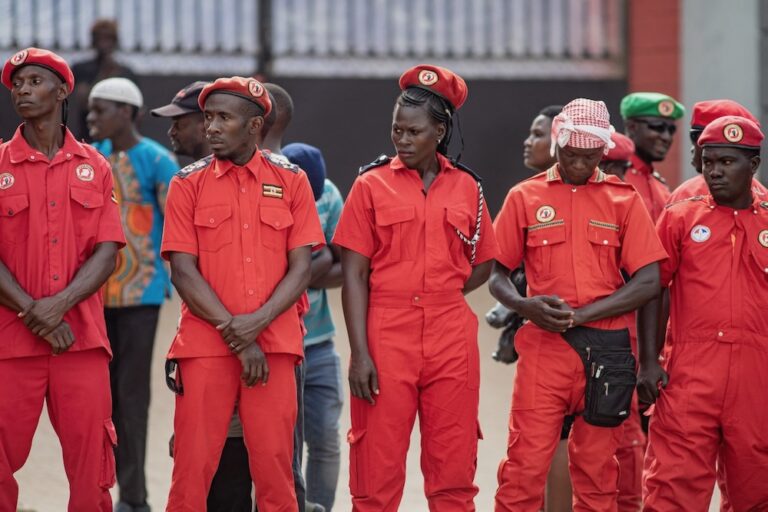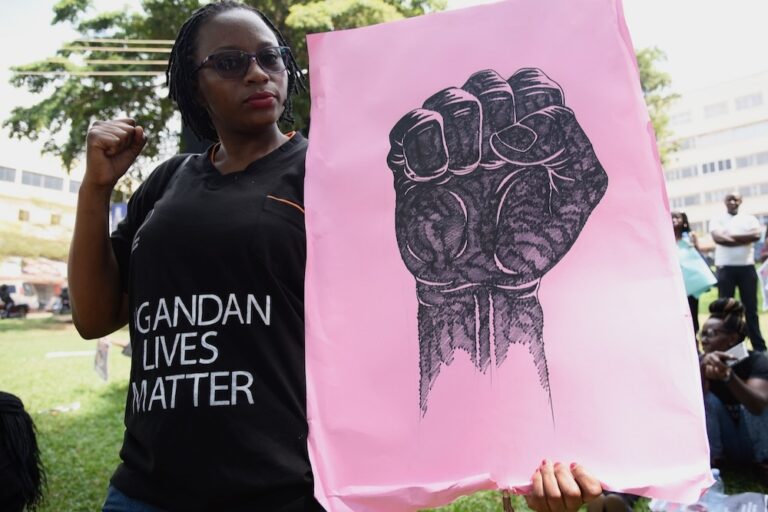Julius Ssenkandwa was struck in the head and injured when a stone was thrown at him while he was covering the arrest of opposition leader Kiiza Besigye.
(HRNJ/IFEX) – Wakiso, 21 October 2011 – NTV reporter Julius Ssenkandwa was struck in the head and injured when a stone was thrown at him by an unidentified individual while he was covering the arrest of opposition leader Dr. Kiiza Besigye. Besigye, the leader of the opposition political party Forum for Democratic Change (FDC), was “walking to work” to protest skyrocketing commodity and fuel prices. Human rights and political activists in Uganda launched a second phase of the popular “Walk to Work” protests on 17 October 2011, demanding government intervention, following the first protests of this nature in April.
Human Rights Network for Journalists-Uganda (HRNJ-Uganda) has learned that police cordoned off all roads leading to Besigye’s residence from the Kasangati trading centre, in Wakiso district, and that journalists who covered the arrest went through areas of bushes to access the scene. Ssenkandwa went to the scene and found law enforcement officers, including police personnel, forcibly arresting FDC supporters, including Besigye’s aides.
“Police officers tried to block me from filming the scuffle, alleging that the footage aired on our station taints the police force’s image. I insisted and moved on with my work, but within a minute a stone hit my forehead close to my left eye, resulting in a large cut,” Ssenkandwa said. He said he rushed to the nearby Kasangati health centre, where he received four stitches.
Several FDC supporters were arrested and Besigye was forced to return to his home, where police are holding him under house arrest.
“We fear for the safety and security of journalists who cover these demonstrations because they are being targeted by law enforcement officers in a bid to block them from publishing their misconduct against the demonstrators. We wonder what would happen to the demonstrators if these violations were to be committed where there is no camera,” said HRNJ-Uganda Programmes Coordinator Geoffrey Wokulira Ssebaggala.
HRNJ-Uganda recalls that during the April Walk to Work demonstrations more than 30 journalists were deprived of their rights and freedoms by law enforcement officers. The organisation demands that all security forces involved in quelling demonstrators adhere to the principles of law and order.
In a separate incident, a “New Vision” newspaper journalist was arrested for accessing Besigye’s residence without police permission. Herbert Ssempoogo a senior reporter at “New Vision”, a government-owned paper, had been assigned to cover a press conference to be held by Besigye on 20 October. HRNJ-Uganda learned that Ssempoogo was intercepted and arrested a few metres away from the gate to Besigye’s residence. “I was asked by police who had given me permission to access Dr. Besigye’s residence and I told them I was going to cover a press conference, and on that note I produced my identification documents. A police officer issued an order for my arrest. I tried to run away out of fear, but they caught up with me and arrested me,” Ssempoogo said.
The journalist said that after the arrest he was taken before a commanding officer named Sam Omara, who was the head of the police contingent responsible for keeping Besigye under house arrest. He said the officer slapped him three times and issued an order for him to be handcuffed. He was then ordered to sit on the ground and remove his shoes, and was later driven to the Kasangati police station. Ssempoogo noted that, upon arriving at the Kasangati police station, he was ordered to provide a statement, after which he was released without a charge.
“It’s clear that the police force is holding the rights and freedoms of journalists hostage. We wonder where these powers come from because there is no law in Uganda or international treaties that oblige journalists to seek permission from police on matters concerning their work,” said HRNJ-Uganda’s Ssebaggala.
HRNJ-Uganda condemns these practices in the strongest term and calls on the Uganda Human Rights Commission to speed up its investigations into violations committed against journalists during the April Walk to Work protests.


